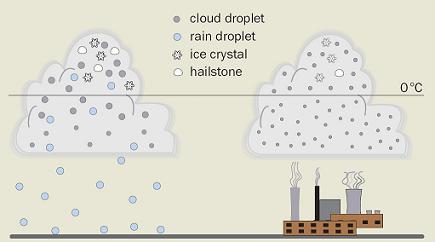The Chinese-Israeli study, led by Prof. Daniel Rosenfeld from the Hebrew University of Jerusalem, warns that if air pollution increases, many countries in the world may dry up

The team of researchers came to this conclusion, after examining the effect of air pollution around the "Yellow Mountain" near Xi'an in central China, on the precipitation rates that have fallen in this area in the last 50 years. The researchers found that during this period there was a sharp increase in the rate of air pollution in this area, and at the same time, the amount of precipitation that fell on the mountain decreased by 20 percent. Moreover, the researchers found that the amount of precipitation that fell on the mountain on the days when the air pollution in its surroundings was at its peak was reduced to almost half the amount that would have fallen without the pollution. These days the visibility around the mountain was low because the air was full of polluted air particles. According to this finding, the increase in the amount of air pollution in the twentieth century explains the trend of reduction in the amount of precipitation observed in a large number of mountainous areas in relation to the amount of rain in nearby lowland areas.
The research will be published on Friday 9.3/XNUMX in the prestigious scientific journal "Science". The journal notes that the study constitutes: "Establishment of the connection between air pollution and precipitation." Prof. Daniel Rosenfeld from the Hebrew University of Jerusalem led the research. Among the other researchers who participated in the research team are Jin Dai from the Meteorological Service of Shaanxi Province and Prof. Zhanyu Yao from the Weather Change Research Department of the China Meteorological Service.
The findings of Prof. Rosenfeld's research sharpen the understanding that the "desertification" phenomenon that has spread in various parts of the world is not only due to the greenhouse effect that causes the temperature of the earth to rise, but rather from air pollution that causes a decrease in rainfall, especially in the mountain areas, which are the main sources of water in the regions semi-arid. For example, the Jordan River receives most of its water from the precipitation that falls in the Golan and Hermon.
According to Prof. Rosenfeld: "The reduction of rainfall specifically in mountainous areas is due to the fact that cloud water washes are formed on dust particles and air pollution. When more air pollution particles are added, more droplets will be formed. The droplets formed in the polluted cloud are smaller, because the given amount of cloud water is divided among a larger number of droplets. The smaller the cloud drops, the longer it will take for them to coalesce into large drops capable of falling to the ground as rain. At temperatures below zero degrees the small drops also freeze more slowly into snowflakes or hail. This is how the polluted cloud becomes "hard to target". The phenomenon is manifested mainly in mountainous areas where air pollution reaches. Above the mountains, the life cycle of the cloud is extremely short - it is formed when the air rises on the side of the mountain that faces the direction of the wind and evaporates as the air descends from the ridge line - therefore when the drops in the cloud are small, the cloud is not enough to rain its water effectively in the short time it exists."
The findings of the research constitute an additional layer to previous studies carried out by Prof. Rosenfeld in the past, in which he studied the trend of decreasing rainfall in mountainous areas. In light of the findings of the studies, the researchers estimate that more areas of the world may become more deserts. Among the areas already suffering from the phenomenon of dehydration: the western United States, central and northern China, South Africa, Portugal, France, Switzerland, Morocco, Canada, Greece, Spain and even Israel.
Along with the destructive effects of air pollution on the environment, it also has certain advantages: the emission of particulate air pollution such as smoke can contribute to the cooling of the Earth's temperature. The particles floating in the air cause a larger part of the solar radiation reaching the earth to return to space without heating the surface. However, Prof. Daniel Rosenfeld believes that the damage caused by air pollution to the environment, including the reduction of rainfall, is more serious than the benefit it can bring to it. This, in particular with reference to a semi-desert country like Israel. "The research findings are especially important for a country like Israel, which suffers from a water shortage to the point of having to desalinate seawater," explains Prof. Rosenfeld. "Therefore, it is clear that the most important expression of climate change in Israel is the change that has already occurred in the rain today." An assessment of the amount of water that air pollution "costs us" in Israel is being carried out in another study, the first results of which will be published within a few months.


2 תגובות
Reading the article I had a very uncomfortable feeling that the author jumps to conclusions too quickly and provides half facts.
The explanation about the "hard-to-target clouds" is also far from satisfactory: after all, the cloud is full of movement and small droplets collide with each other all the time.
Do you have a link to the study itself? I'm interested to see if it is made more carefully than the press release.
It is correct to add and point out that: China is a "good" place for such a study since the industrial pollution there competes with that of the USA,
At the same time, a Chinese researcher publishes a conclusion that the pollution from China and India causes the intensification of storms in the Pacific Ocean, storms that send warm air to the North Pole and thus stimulate the melting of the glaciers.
For all this it is worth mentioning our "rain people" who for years
They are trying to take advantage of the condensation of water droplets around grains (pollution?) to increase the rainfall... so far without significant success.
As for desertification, the majority of the desertification process is mainly due to overgrazing, cutting down trees, overexploitation of existing water sources and their drying, the amount of rain (minimal anyway) has a secondary effect.